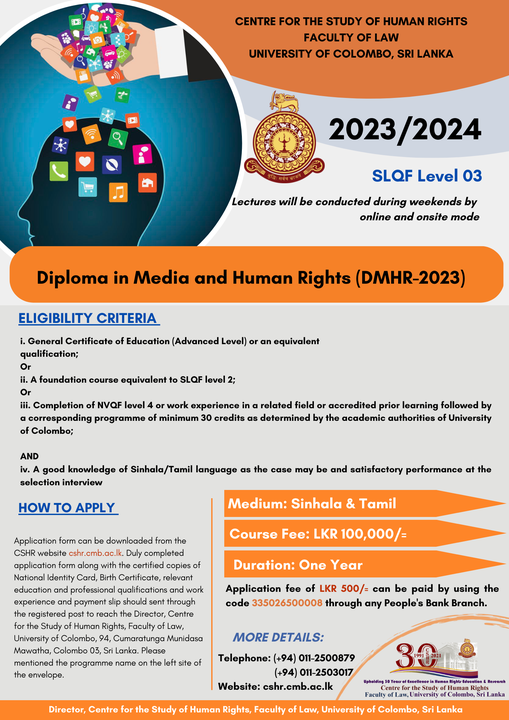
Introduction
The field of Media Law has become an important body of knowledge in disciplines such as Law, Media, Social Work, Sociology, Public policy formulation and implementation etc. It has been an evolving subject in all academic levels with the growing democracy and modernization throughout the world. Diploma in Media and Human Rights is a practice-oriented programme targeted at Media Sector, Professionals engaged in Journalism and the students interested in the relevant academia. Media Law and Laws relating to the journalists have drawn the attention of academics, administrators, policy makers, NGOs, INGOs, Donor community and interested members of the civil society over the past years. This programme is intended to provide and develop the necessary knowledge, enhance the skills and inculcate attitudes in the area of Media and Journalism.
The prospective applicants will be those who are interested in studying the interface between human rights and media and are Journalists, Academics, Government officers and law enforcing officers who deal with issues pertaining to Media and Journalism, Personnel who engage in work in the Media Sector and other interested persons and professionals engaged in the relevant field and the interested members in the civil society.
This course is designed based on the credit value system of Sri Lanka Qualification Framework Level 3 (SLQF 3).
Credits and Duration – Students must complete 30 credits within the period of one year (01).
Medium of Instruction – This course will be conducted in Sinhala and Tamil medium.
Assessment – Assessment will consist of Continuous Assessment and End of Semester Examination.
Academic Resource Pool – The lecture panel will be comprised of highly qualified members of academia, practitioners and professionals from the industry.
Contents
- Introduction to Human Rights
- Media and Human Rights
- Media and Society
- Laws related to Media
- Accountability of the Press
- Public Performances and Advertising
- Media Ethics – Workshop
- Case Study based Report
- General Certificate of Education (Advanced Level) or an equivalent qualification;
Or
- A foundation course equivalent to SLQF level 2;
Or
- Completion of NVQF level 4 or work experience in a related field or accredited prior learning followed by a corresponding programme of minimum 30 credits as determined by the academic authorities of University of Colombo.
AND
- A good knowledge of Sinhala/Tamil language as the case may be and satisfactory performance at the selection interview
Application Fees: Rs. 500
Course Fee: Rs. 100,000
Completed Applications and certificates should be submitted along with the paying voucher of the non-refundable application fee.
Payment of the application fee can be done through the following options.
- To provide candidates with the relevant contextual and systematic knowledge on main concepts, principles on laws relating to media and journalism.
- To provide a clear focus on the international frameworks – protecting Journalist’s
- To provide a clear knowledge on special aspects of Media law and laws relating to Journalism; special reference to Right to information, Freedom of Expression, Laws on Defamation in media and Media ethics.
- To equip candidates with the knowledge of Local Acts, statutes and existing institutional mechanisms related to Media Law.
- To stimulate them to identify gaps between international standards and domestic laws and institutional mechanisms as well as between national policy and laws;
- To Provide clear tools, principles and methodologies for contributing to the processes of media protection and prevention.
- To motivate them to address the challenges encountered in enforcing the laws.
Learning Outcomes;
- To understand the main concepts, principles on media law and laws relating to journalism.
- To analyse the special aspects of media law and laws relating to journalism.
- To evaluate the adequacy of international and domestic legal framework on media law and laws relating to journalism.
- To examine the process of institutionalization of media firms.
- To discuss the international mechanism related to media law and laws relating to journalism and identify the gaps where necessary.
- Address the challenges encountered in enforcing the laws.
Duly Completed Applications along with relevant copies of certificates and documents should be submitted by registered post to:
The Director,
Centre for the Study of Human Rights,
Faculty of Law, University of Colombo,
No.94, Cumaratunga Munidasa Mawatha, Colombo 03.